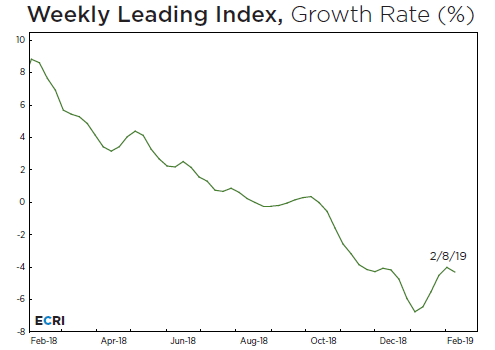The US Fed has led the world in 20 years of progressively more extreme monetary interventions to inflate debt and asset prices at all costs. Each time that US stock markets have dropped more than 10%, central banks have moved to ‘ease’ volatility with more and longer monetary ‘accommodation’. Nevertheless, in both 2001 and 2007, despite slashing some 5% off benchmark interest rates, recessions arrived, and stock and corporate bond prices fell by half.
It took a drop of just 14% in the S&P 500 in 2018 for the US Fed to switch from telegraphing rate hikes through 2019, to promises of further patience and pause. Not satisfied, many market participants are already calling for central banks to abandon ‘normalization’ goals and switch back to cutting rates and ‘supporting’ asset buying once more. See The Fed’s “First do no harm” policy is harmful from Economic Cycle Research Institute’s Lakshman Achuthan to wit:
“Removing the risk of a recession and sparking a renewed acceleration in economic growth – never mind reigniting inflation pressures – will require much more than the doctrine of primum non nocere, meaning first, do no harm. The Fed would actually need to start a rate cut cycle.”
At the same time, Achuthan acknowledges that the global slowdown now underway is an overdue part of the cycle, set to continue for many months, no matter what the Fed does next:
The problem is that, regardless of what Powell has said, the cyclical drivers of economic growth continue to wind down, meaning that the slowdown is set to continue. That’s the objective message from the same array of leading indexes that we used to predict the current U.S. economic slowdown in the context of a global slowdown last year. A case in point is the publicly available U.S. Weekly Leading Index, whose growth rate remains in a cyclical downswing.
The fact is that in always wanting to accommodate further debt and risk-taking, central banks have inflicted great harm on the world economy, financial strength, and stability. Politicians and sales firms have urged them to do it, to be sure, and consumers commonly fail at personal discipline, but the actors at central banks are supposed to be the impartial, prudent experts working to smooth economic cycles so they are less damaging as a whole. In this, they have failed utterly.
I have zero faith that central banks will change course now. I also understand that the downcycle is due even as central banks attempt to ease further in the months ahead. Policymakers have failed in their mandated duties of care and control. Like children who realize their caregivers are not up for the task, individuals must look out for their own best interests.



